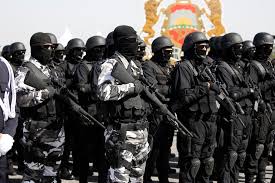
Washington Hails its Excellent Counterterrorism Cooperation with Rabat
 The United States has lauded its “excellent and long-standing” counterterrorism cooperation with Morocco, a major non-NATO ally and one of the major US strategic partners in the region.
The United States has lauded its “excellent and long-standing” counterterrorism cooperation with Morocco, a major non-NATO ally and one of the major US strategic partners in the region.
In its annual terrorism report released Nov.1, the State Department says Morocco continued its comprehensive counterterrorism strategy that includes vigilant security measures, regional and international cooperation, and counter-radicalization policies.
According to this report, the counterterrorism efforts made by Morocco in 2018 largely mitigated its risk of terrorism, although the country continued to face sporadic threats, largely from small, independent terrorist cells, the majority of which claimed to be inspired by or affiliated with ISIS.
Last year, Morocco experienced its first terrorist incident since 2011 with the killing of two Scandinavian tourists in December. Morocco is an active participant in the Global Coalition to Defeat ISIS, recalls the report, stressing that Morocco is a member of the GCTF and co-chair of the GCTF with the Netherlands.
The document noted that Moroccan security services leveraged intelligence collection, police work, and collaboration with international partners to conduct counterterrorism operations.
The US report also cites the participation of Moroccan law enforcement agencies in a wide range of US-sponsored programs to improve the country’s technical and investigative capabilities, including financial investigation, intelligence analysis, and cybersecurity.
According to the report, border security remained a top priority for Moroccan authorities. The General Directorate for National Security has primary responsibility for conducting border inspections at ports of entry such as Casablanca’s Mohammed V Airport. Law enforcement officials and private airline carriers worked regularly with the United States to detect and deter individuals attempting to transit illegally and to address watchlistsed travelers.
The report praised the Moroccan airport authorities excellent capabilities in detecting fraudulent documents. In addition, police, customs officers, and the Royal Gendarmerie operated mobile and fixed checkpoints along the roads in border areas and at the entrances to major municipalities. Moroccan naval and coast guard units monitored and patrolled Morocco’s extensive coastal waters, including the Strait of Gibraltar, to interdict illicit traffickers.
On Morocco’s efforts to counter terror financing and violent extremism, the document recalls that Morocco is a member of the MENA Financial Action Task Force (MENAFATF) and its FIU, known as the Unité de Traitement du Renseignement Financier, and is a member of the Egmont Group.
Morocco also has a comprehensive strategy to countering violent extremism (CVE) that prioritizes economic and human development in addition to countering radicalization and oversight of the religious sphere.
To counter religious extremism, Morocco promotes a moderate Islam and provides a training to nearly 50,000 imams and female preachers (mourchidates).
In prisons, the Department of State has supported the General Delegation for Prison Administration and Reintegration’s (DGAPR’s) efforts to modernize prison management, develop prisoner classification tools, and construct more secure facilities.
In August, Morocco’s King Mohammed VI pardoned 14 detainees following their renunciation of terrorist views after their successful completion of the DGAPR rehabilitation program.
